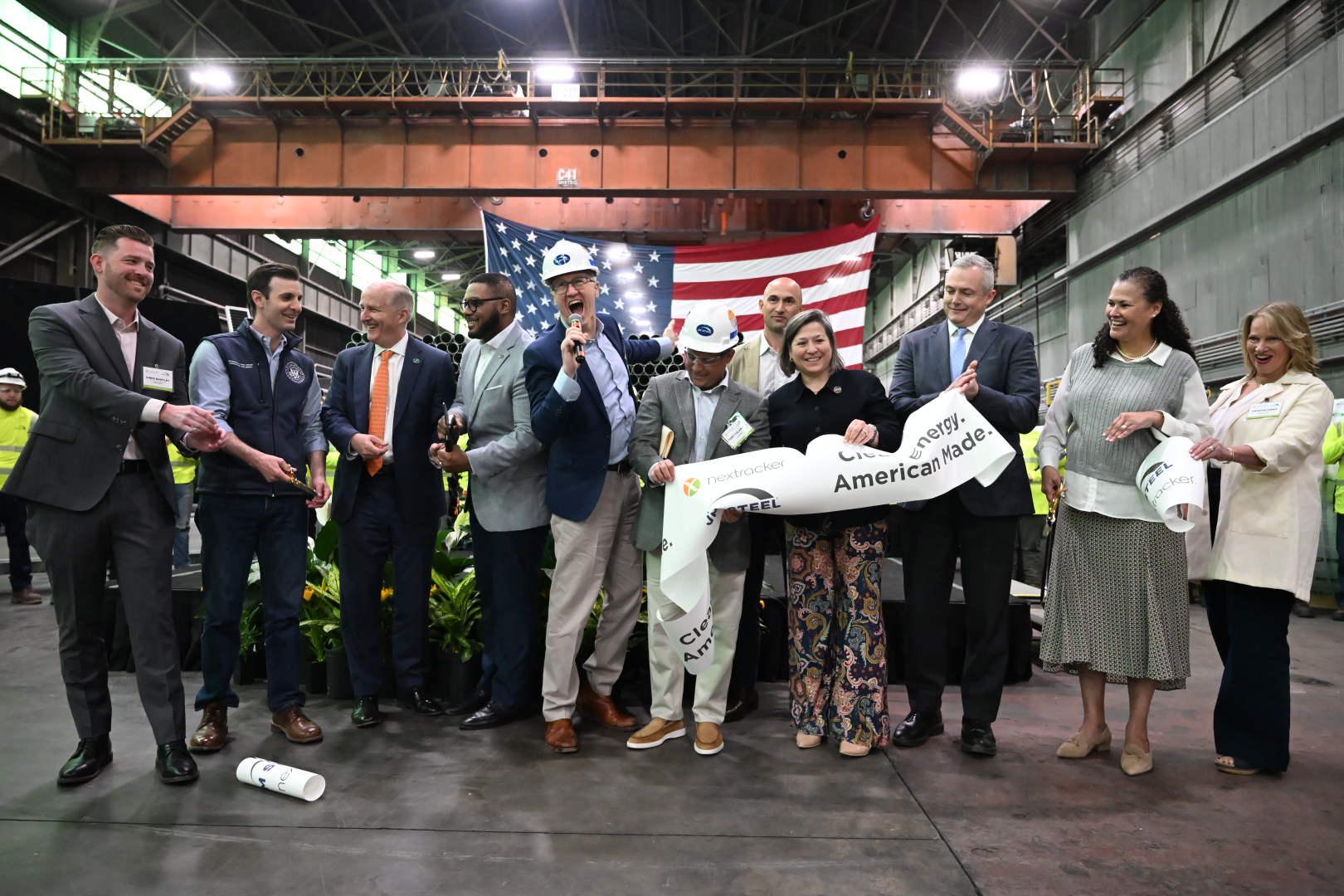JM Steel Advances the U.S. Energy Transition from Pittsburgh

Steel manufacturer JM Steel, a JENNMAR Holdings subsidiary, and utility-scale solar tracker leader Nextracker recently announced an expansion to their successful partnership in Pittsburgh, Pennsylvania. Their partnership began in 2022 when JM Steel reopened the historic Bethlehem Steel Manufacturing factory to produce the necessary steel torque tubes for Nextracker’s large-scale solar power arrays.
This expansion represents the increasingly critical role American steel manufacturing plays in advancing the clean energy industry’s essential technology and in reducing the global greenhouse gas emissions causing climate change.
Plugging into the Past to Advance Our Sustainable Future
The next-gen battery technology powering Project AMAZE is the Eos Z3™ energy storage system. Eos developed this product as an alternative to lead-acid, sodium-sulfur, vanadium redox and lithium-ion batteries for stationary battery storage applications. A domestically made, long-duration battery, the Eos Z3™ is a zinc-powered energy storage system that is inherently non-flammable and fully recyclable at end of life. This system can store and dispatch energy on the electric grid from renewable energy sources such as wind and solar.
The Eos Z3™ Cube is powered by Eos’s Znyth™ technology battery energy storage system (BESS). This technology, 16 years in the making, uses a zinc battery in its manufacturing and is designed to meet cost-effective, long-duration, grid-scale stationary energy storage needs on a mass-production scale.
Tax credits written into the Inflation Reduction Act (IRA) have incentivized implementation of long-duration energy storage solutions, thus increasing the demand for innovative products. A expansion of Eos’s presence in the Mon Valley, via Project AMAZE, would significantly help to address growing market demand.
In addition to growing Eos’s state-of-the-art manufacturing facility and the Mon Valley workforce, this expansion would efficiently scale the domestic production of low-cost, long-duration energy storage. This production is critical to delivering climate-conscious battery systems at this crucial moment in the global energy transition.
A recent partnership between Eos and Wisconsin-based Acro Automation Systems will further enhance the facility by creating high-output manufacturing lines, with the first line landing in their manufacturing facility located in Turtle Creek.
Leading the Charge from Pittsburgh
JM Steel, formerly BCI Steel, has a rich history in the Pittsburgh region. Since 2000, this manufacturer has contributed significantly to the local industrial landscape. In 2022, Nextracker breathed new life into JM Steel’s production line by reopening the historic Bethlehem Steel Manufacturing factory in Leetsdale and aligning itself with the region’s burgeoning clean energy sector.
Since the beginning of JM Steel and Nextracker’s partnership, employment in the Leetsdale facility has tripled. This most recent expansion will double the facility’s production capacity and feature cutting-edge technologies, like state-of-the-art solar tube lines.
The Leetsdale facility centers on manufacturing steel torque tubes, a crucial component for Nextracker’s solar trackers. These trackers maximize the efficiency of solar panels by orienting them toward the sun, thereby increasing green energy capture. Nextracker’s trackers serve the growing demand for solar energy in Pittsburgh and North American markets, such as New York and Ohio.
JENNMAR Holdings, JM Steel’s parent company, has significantly supported this shift to solar parts manufacturing. In the past four years, JENNMAR has financed various ESG initiatives, including investing $100 million in the U.S. solar industry. This investment in renewable power generation reflects the company’s serious commitment to sustainable energy solutions.
Federal incentives have played a critical role in spurring this commitment. For instance, the Section 45X tax credit incentivizes the production and sale of renewable energy storage components. This credit has enabled companies like JM Steel to scale their operations, underscoring the U.S. government’s commitment to a fossil-fuel-free future by investing in renewable energy companies.
Nextracker’s partnership and JENNMAR Holdings’s investments have positioned JM Steel at the forefront of the clean energy system revolution. The expansion of manufacturing capabilities and the supportive regulatory environment underscores the robust potential for growth in the U.S. solar industry, paving the way for a more sustainable future.

The Climate Tech Future is Bright in Pittsburgh
Pittsburgh’s rich manufacturing history in the steel industry has provided a robust foundation for its current capabilities in the renewable energy sector. This legacy has fostered a culture of problem-solving and innovation, allowing the region to adapt and thrive in new technological landscapes. As a result, the transition to manufacturing renewable energy sources—such as offshore wind turbines, carbon capture systems and hydroelectric power—is a natural progression for a region renowned for its industrial strength and resilience.
The Pittsburgh region is home to over 70 cleantech, decarbonization and energy transition companies, highlighting a vibrant ecosystem dedicated to sustainable innovation. Pittsburgh’s highly skilled tech talent and strategic location have attracted these businesses to the region.
Pittsburgh boasts globally renowned universities like Carnegie Mellon University and the University of Pittsburgh. These prestigious institutions produce top-tier STEM graduates, creating a steady pipeline of talent ready to drive the research, development and implementation of low-carbon technologies.
Moreover, Pittsburgh’s strategic location and robust infrastructure enhance its role in advancing the U.S. energy portfolio. The region is well-connected, with access to major supply chain networks and proximity to key markets in North America, such as the Northeast U.S. and Canada. This logistical advantage facilitates the efficient distribution and deployment of renewable energy production technologies.
Contact Us
Connect with the Pittsburgh Regional Alliance to learn more about this historic partnership and the region’s role in advancing America’s energy transition and sustainability.